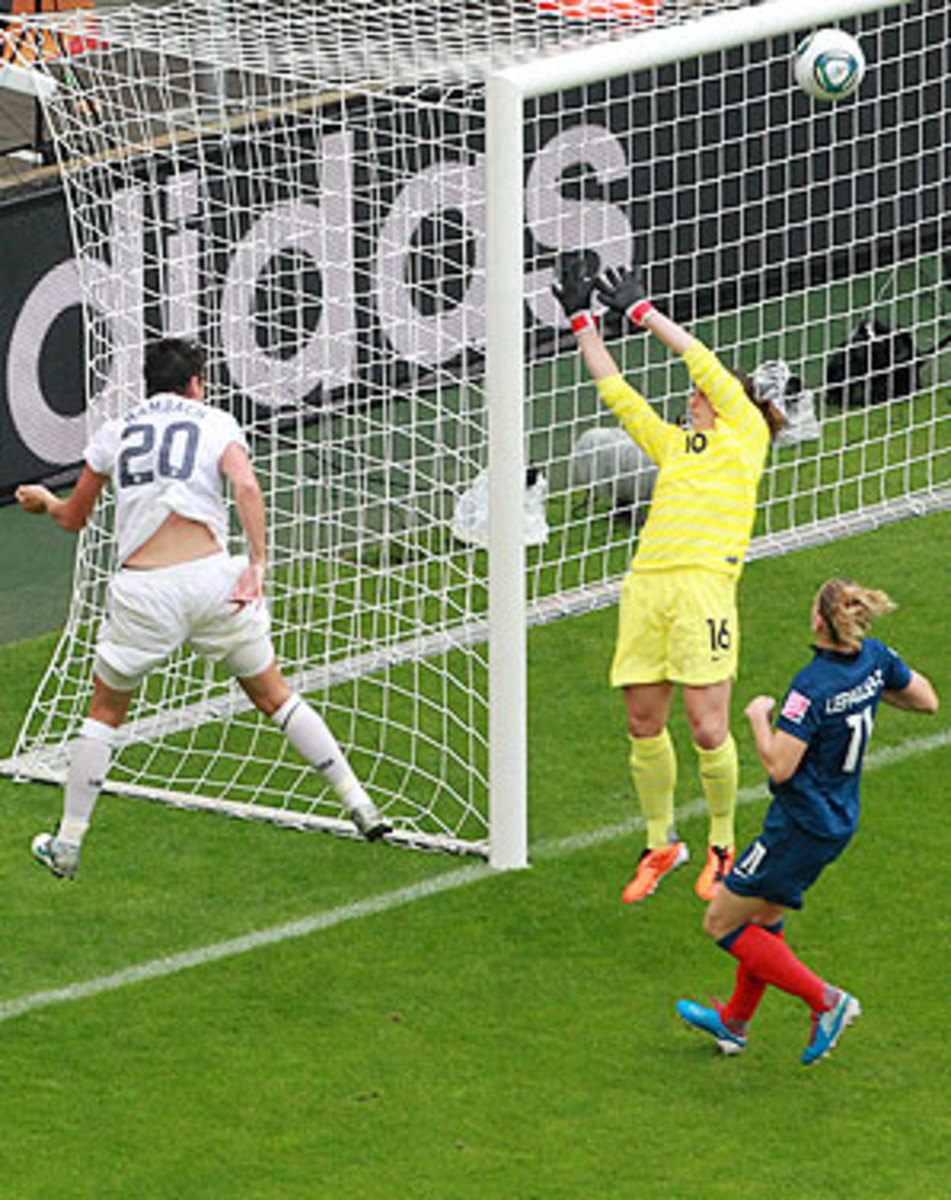ESPN's Women's World's Cup coverage has drawn eyeballs
In his most memorable call of the Women's World Cup, ESPN announcer Ian Darke howled with delight that "Abby Wambach has saved the U.S.A's life in this World Cup."
Had Darke exchanged "ESPN" for "U.S.A.," he would also have been correct.
ESPN executives knew the only hope of drawing ratings traction for the month-long tournament in Germany was for the U.S. team to advance to the final in Frankfurt on July 17, and Wambach's header in the dying moments of the quarterfinals against Brazil last week lifted both her squad and ESPN off life support. The Brazil miracle was followed by a pulsating win over France, which the always-lyrical Darke called "The Mission at Moenchengladbach."
The public has eaten the coverage up like a tasty plate of weisswurst. The U.S. win over the French -- which aired Wednesday afternoon in the Eastern Time Zone -- was seen by an average of 3.35 million people, according to the Nielsen Company. It was the fourth most-viewed Women's World Cup match ever and the tournament's highest-rated afternoon game in the U.S. The quarterfinal against Brazil drew 3.89 million viewers, making it the third-most viewed WWC match ever.
While Sunday's final against Japan (2 p.m., ESPN, ESPN3) won't reach the epic ratings of the 1999 Women's World Cup final -- that game drew 17.9 million viewers on ABC -- ESPN has a real possibility of surpassing the 4.9 million who watched the U.S. defeat Brazil in the 1999 WWC semifinals. That game ranks as the second-most viewed women's soccer game in history.
Ratings have been a very good story for ESPN this tournament. Through the semifinals (30 matches), the World Cup is averaging a 0.6 U.S. rating on ESPN and ESPN2, up 200 percent from the 2007 tournament in China, when games were played in the middle of the night. ESPN has averaged 934,000 viewers for the entire tournament, up 218 percent from 2007 (294,000 viewers). ESPN3.com has had strong traffic as well.
"We had great hopes we would get to some measure of our success to date but needless to say we have benefited immensely in the interest of the U.S. team as a result of their remarkable play on the field," said Jed Drake, an ESPN senior vice president and executive producer and the executive charged with leading the coverage in Germany.
No sports network loves to celebrate itself more than ESPN, but the network has reason to gloat over its production in Germany. The game visuals have been terrific -- ESPN will add cameras (22 in all) for Sunday's final, including a spider-cam --and the network's traveling studio has provided sumptuous backgrounds for its pregame and postgame shows. Darke has proven a draw, as always, and his call of Wambach's goal against Brazil was sublime. The network has hustled to get reaction from the players immediately after games. For women's soccer fans, ESPN's tonnage across its platforms has been impressive. Woody Paige and Colin Cowherd discussing women's soccer is no accident, nor spell set upon those blabbers by Hermione Granger. It's part of the ESPN blueprint to flood the zone and it has risen the profile of the sport.
Are there places ESPN can improve? Of course. The chemistry of Darke and lead analyst Julie Foudy is a work in progress, and the duo seemed unaware, at times, of the clock during the extra session against Brazil. Foudy is smart, and has significantly improved from her early work on ESPN's chat shows. (The never-shy message jockeys at Big Soccer.com have their say on Foudy here.) But where the former national team player can still improve is drawing the line between advocacy and commentary. The "we's" and "our's" still pop up into her announcing occasionally. Most fans won't be bothered by that, but there exists a thin line between advocacy and journalism in some of ESPN's niche sports, especially tennis and women's soccer.
"I believe, to a reasonable extent, we have found the right place in terms of that balance in terms of covering the event," said Drake. "I would not use the term advocacy. I think it is something less than that. But at the same time I think it is virtually impossible to have the cast of announcers that we have, and not have some measure of pride if you will in the job that this team has done for all the reasons that America has warmed up to it. And I honestly don't think there is anything wrong with that. I think we have found a balance. We are not cheerleaders for this team but needless to say, we are pleased when they perform to the extent that they have."
(On a different note: Drake, the ESPN executive, highlighted the story of the Japanese team on a recent conference call and ESPN would be wise Sunday to focus on the impact their run has had on that country to its American audience).
Foudy said that it was a challenge to separate herself from the team when she initially retired but that is no longer the case. "Everyone knows I played for the team, so there is that in there inherently," Foudy said. "But I want to stay fair to the game. The last thing you want to come off as is as a cheerleader for the United States. It is a fine balance. Obviously, internally, I want that team to do well. There are a lot of players I played with. At the same time I have to call the game as objectively as I can and kind of step out of that."
The stage will be huge for Foudy and her colleagues Sunday, but it also presents a great opportunity. No women's soccer game has been this anticipated since Foudy's team had its iconic moment 12 years ago.






